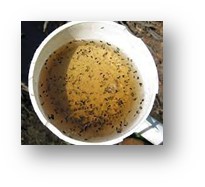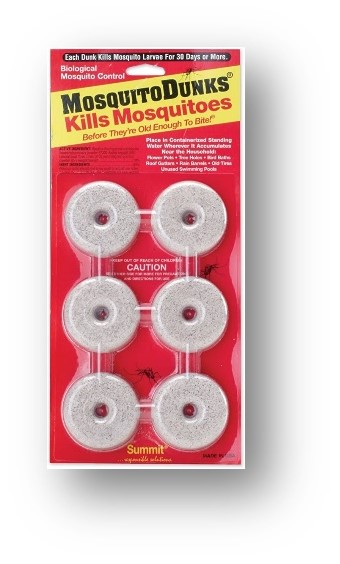Nature Friendly Mosquito Control: Build Your Own Dunk Bucket
Protect yourself and our pollinators!
How does it work?
Female mosquitos are attracted to the standing water and lay their eggs in the bucket. The eggs hatch into larvae and the Mosquito Dunk kills the larvae.

What’s in the Mosquito Dunk?
A larvicide, Bacillus thuringiensis (Bti) is specific for aquatic mosquito larvae and soil fungus gnats.
Why is it better than having an insect or pest control company spray?
- Killing mosquitos in the larval stage rather than adult mosquitos is much more effective (100%).
- Most importantly it doesn’t harm beneficial insects.
- It’s less expensive, saving money and pollinators.
But the mosquito companies spray an organic material, doesn’t that make it safe?
Sprays don’t discriminate. Natural and Organic sprays kill both beneficial and pest insects, too.
Is it safe for kids and pets?
YES. Dunks do not harm people, pets, or the environment.
Are there other nature friendly options?
YES. Apply a personal repellent to your skin and clothing.
Making the Mosquito Dunk Bucket Is Easy:
 Supplies needed to make the Dunk Bucket:
Supplies needed to make the Dunk Bucket:
- A bucket, any size or color. A 5-gallon bucket is recommended.
- Grass clippings, or any organic material collected from your yard.
- Water
- Mosquito Dunk (purchase at any hardware store)
How do you put it together?
- Drill hole towards the top of bucket to control overflow of water during rainy periods.
- Add water to about half full, add water as needed to keep the mixture wet and in standing water.
- Add a handful or two of straw, grass clippings, or other organic material from your yard.
- Add Mosquito Dunk. ¼ of one donut is enough for a 5-gallon bucket.
- Place chicken wire over the top and secure to prevent something from falling into the bucket.
- Add a new ¼ donut Dunk to the bucket every 30 days, the longevity of the dunk larvicide.
- At the end of the season, clean the bucket and store for next year.
For more information: Contact the Johnson County K-State Research and Extension Gardening Hotline: 913-715-7050 or garden.help@jocogov.org
Source: Doug Tallamy, University of Delaware, Entomologist